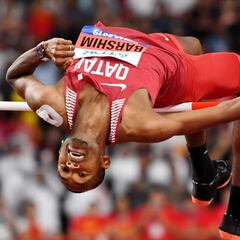Distance training, a new Aspetar initiative to help confined athletes
Doha based leading specialised orthopaedic and sports medicine hospital Aspetar is offering a series of guidelines to help athletes train during the Covid-19 pandemic.

Aspetar, the Doha based sports medicine and orthopaedic hospital has published a video through digital platforms and social networks which offers a series of exercises that can be done from home with the video aimed at athletes who are confined in their respective residences due to the spread of the Covid-19 virus.
The objective of the 16 minute video endeavours to ensure that athletes remain active during this period of confinement imposed by the pandemic with the suspension all sporting activities and ensuring that individuals maintain a safe distancing discipline.
The videos are presented by specialists in physical conditioning who have worked with athletes at Aspetar. They are a series of professional athletes with a rich wealth of experience and possess a rich knowledge on the beneficial exercises that can be conducted from the confinement of the home without the need for additional equipment.
#COVID-19 Evidence for Athletes portal: A great source of evidence-based information on the COVID-19 pandemic to athletes and those involved in athlete (health) care.#coronavirus #COVID19 #athletes @DrPaulDijkstra
— Aspetar سبيتار (@Aspetar) April 1, 2020
Three fitness experts
Fitness trainers Flambia Cederopoulos, Laurent LaSalle and Girgely Case divide the exercises into four categories with each section dedicated to a body part such as the upper and lower body as well as a series of exercises focused on the cardiovascular system. They recommend to conduct these exercises regularly (at least three to five days a week) and for 30 to 45 minutes for each drill.
Each session focuses on 6 to 8 exercises which last from 20 to 60 seconds, and are repeated 10 to 12 times for each exercise. A 30 to 60 second of rest between each routine offers the athlete a respite to cool off and rehydrate.
The initiative sees Aspetar continuing to provide support for athletes along with applying preventive procedures that aim an optimum level of health for all athletes and further embody the sporting role of Aspetar as an outlet in providing the best preventive and medical services along with a focus on an educational role for athletes and society.
Aspetar continues to use its electronic platforms and social networks to publish educational programs for its audience, in which recommendations are presented along with Aspetar's interest in sharing information and science with specialists and experts in the field of sports medicine around the world.
Video 📹
— Aspetar سبيتار (@Aspetar) March 31, 2020
Maintain your #physical condition while being at home during this period of “physical distancing”?
Here are some advanced #exercises that we have specially prepared for athletes.
📹 Watch The full video 👉 https://t.co/s5pYsPpfel#CoronaVirus #Corona #COVID2019 pic.twitter.com/zqxLX7snjI
Related stories
The first Aspetar live transmission was broadcast on Tuesday (March 31) at 16:00 local time in Doha with session number two set to air at the same time on Thursday, April 2.
Aspetar has also produced a series of educational videos which were made available via the official YouTube channel which investigate and explore phases of rehabilitation and treatment for injured athletes. These include: ways of assessing injuries, exercises to maintain good fitness levels and also offer advice on treating some of the most common injuries.
